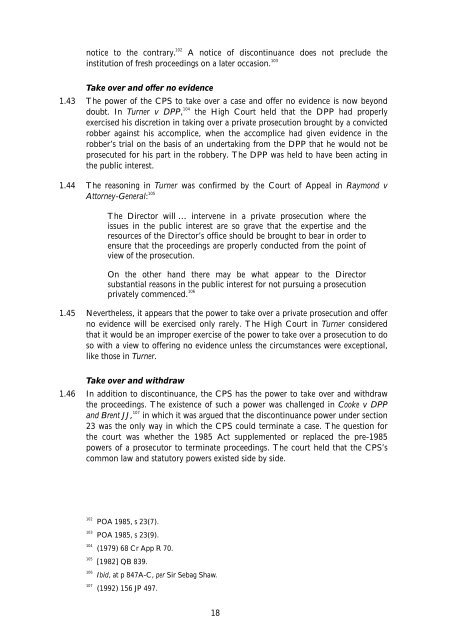cp149 Consents to Prosecution consultation - Law Commission
cp149 Consents to Prosecution consultation - Law Commission
cp149 Consents to Prosecution consultation - Law Commission
You also want an ePaper? Increase the reach of your titles
YUMPU automatically turns print PDFs into web optimized ePapers that Google loves.
notice <strong>to</strong> the contrary. 102<br />
A notice of discontinuance does not preclude the<br />
institution of fresh proceedings on a later occasion. 103<br />
Take over and offer no evidence<br />
1.43 The power of the CPS <strong>to</strong> take over a case and offer no evidence is now beyond<br />
doubt. In Turner v DPP, 104<br />
the High Court held that the DPP had properly<br />
exercised his discretion in taking over a private prosecution brought by a convicted<br />
robber against his accomplice, when the accomplice had given evidence in the<br />
robber’s trial on the basis of an undertaking from the DPP that he would not be<br />
prosecuted for his part in the robbery. The DPP was held <strong>to</strong> have been acting in<br />
the public interest.<br />
1.44 The reasoning in Turner was confirmed by the Court of Appeal in Raymond v<br />
At<strong>to</strong>rney-General: 105<br />
The Direc<strong>to</strong>r will … intervene in a private prosecution where the<br />
issues in the public interest are so grave that the expertise and the<br />
resources of the Direc<strong>to</strong>r’s office should be brought <strong>to</strong> bear in order <strong>to</strong><br />
ensure that the proceedings are properly conducted from the point of<br />
view of the prosecution.<br />
On the other hand there may be what appear <strong>to</strong> the Direc<strong>to</strong>r<br />
substantial reasons in the public interest for not pursuing a prosecution<br />
privately commenced. 106<br />
1.45 Nevertheless, it appears that the power <strong>to</strong> take over a private prosecution and offer<br />
no evidence will be exercised only rarely. The High Court in Turner considered<br />
that it would be an improper exercise of the power <strong>to</strong> take over a prosecution <strong>to</strong> do<br />
so with a view <strong>to</strong> offering no evidence unless the circumstances were exceptional,<br />
like those in Turner.<br />
Take over and withdraw<br />
1.46 In addition <strong>to</strong> discontinuance, the CPS has the power <strong>to</strong> take over and withdraw<br />
the proceedings. The existence of such a power was challenged in Cooke v DPP<br />
and Brent JJ, 107<br />
in which it was argued that the discontinuance power under section<br />
23 was the only way in which the CPS could terminate a case. The question for<br />
the court was whether the 1985 Act supplemented or replaced the pre-1985<br />
powers of a prosecu<strong>to</strong>r <strong>to</strong> terminate proceedings. The court held that the CPS’s<br />
common law and statu<strong>to</strong>ry powers existed side by side.<br />
102 POA 1985, s 23(7).<br />
103 POA 1985, s 23(9).<br />
104 (1979) 68 Cr App R 70.<br />
105 [1982] QB 839.<br />
106 Ibid, at p 847A-C, per Sir Sebag Shaw.<br />
107 (1992) 156 JP 497.<br />
18
















